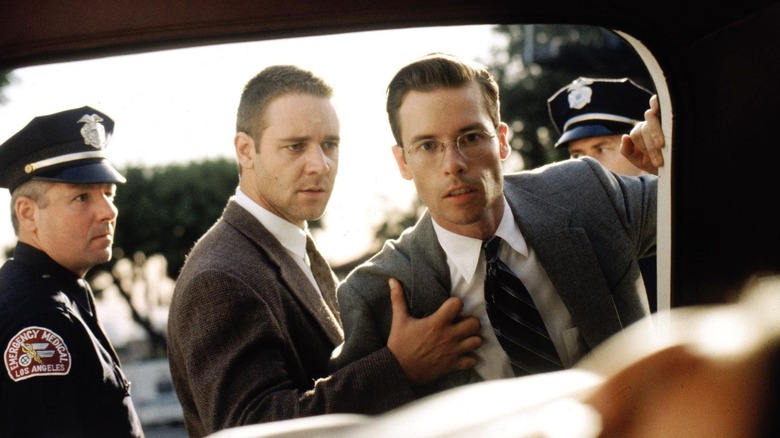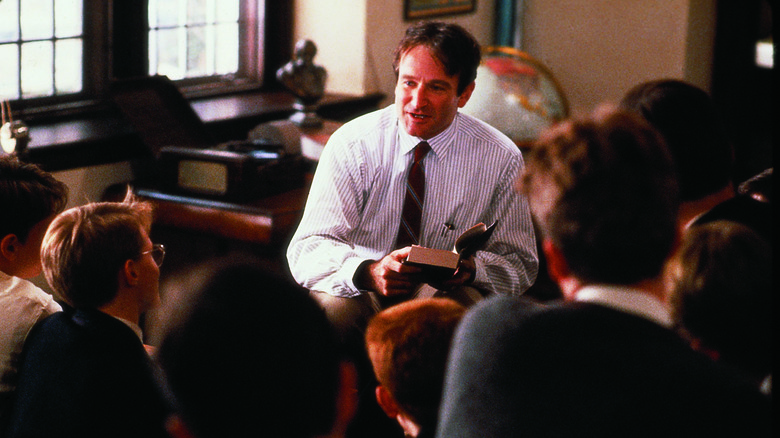A 1997 Crime Thriller Is The Best Movie Of All Time According To Rotten Tomatoes
One of the most famous scenes in Peter Weir's "Dead Poets Society" finds unorthodox prep school English teacher John Keating vilifying an essay written by the fictional Dr. J. Evans Pritchard that seeks to determine the excellence of individual poems via the application of a geometrical formula. The works of Byron and Shakespeare are measured in terms of their importance and degree of technical perfection; those that score highly on both counts cover a large area, and are thus considered truly "great." The horrified Keating therefore commands his teenage pupils to tear Pritchard's laughably square introduction out of their textbooks.
Art is not math. Creative works can't be measured on a numerical scale, or, worse, by up- or downturned thumbs. When you walk out of a movie or hash out your feelings about a novel with your book club compatriots, you don't quickly assign whatever it is you've just engaged a number, finish your coffee, and go home. I mean maybe you do. If you do, rest assured that I never ever want to meet, let alone know you.
Life is, however, infuriatingly short, and we have never had more competition for our free time than we do today. There are more movies and TV shows and books than ever before, and now we've also got podcasts, blogs, and vlogs vying for our attention. You can't see/read/hear it all. You can't come close. So, if you're wondering whether the new "Alien" movie is worth your time, you might peruse an aggregator like Rotten Tomatoes for guidance. This is entirely understandable.
But if you're looking to read a list ranking the greatest movies of all time, you should turn to an organization with the highest possible standards. You don't want all academics necessarily, but you should absolutely seek out the opinions of people who know their film history (i.e. have studied and routinely watch films made before 1970). This is not a job you leave to Rotten Tomatoes, and you won't find a firmer defense of their unfitness in this exercise than their own methodology for selecting the 300 best movies of all time.
A try-hard failure from a media outlet that ought not be trying at all
Curtis Hanson's "L.A. Confidential" is a great movie. It's a tightly plotted neo-noir that manages the minor miracle of making James Ellroy, "the demon dog of crime fiction," palatable without defanging his remorselessly vicious yarn. Screenwriter Brian Helgeland plays rough, and Hanson's phenomenal cast (led by Guy Pierce, Kevin Spacey and Russell Crowe) belong to this intensely corrupt era of Los Angeles. If you told me this is your favorite movie, I'd respect your choice.
But if your case rested on the findings of Rotten Tomatoes' formula, I'd tear you out of my life like you were Dr. J. Evans Pritchard made flesh. Here's how RT concluded "L.A. Confidential" is the greatest film ever made:
"How did we select and rank the movies? First, every movie here is Certified Fresh. Then we applied our recommendation formula, which considers a movie's Tomatometer rating with assistance from its Audience Score, illuminating beloved sentiment from both sides. Critics-certified, audience-approved!"
First off, the audience score is useless. Even though RT altered the requirements of the Popcorn meter two years after a legion of man-babies tanked the rating of "Star Wars: Episode VIII — The Last Jedi" (you have to provide ticket-purchased proof that you've seen the film in question), the list is still heavily driven by anyone with an active account –- which means a person who's seen a total of 20 movies gets a say in a poll that includes hundreds of reviews from authorities like Roger Ebert, Carrie Rickey, and Kenneth Turan.
Now, the weighting does work well enough to ensure that pre-1970 masterpieces like "Citizen Kane," "Singin' in the Rain," and "The 400 Blows" make the cut, but any list that doesn't include Chantal Akerman's "Jeanne Dielman: 23 quai du Commerce, 1080 Bruxelles," which recently topped Sight and Sound's prestigious ranking of the greatest 100 films of all time (they consult critics, academics and filmmakers), is as useless as David Zaslav running a media company — or doing much of anything really.
What's the value of lists anyway?
To be fair, the Rotten Tomatoes top 300 could be a lot more risible. Christopher Nolan's "The Dark Knight" doesn't turn up until 51, and, given the participants, there aren't an unreasonable number of comic book movies on the list. There are a number of movies I do not like represented here, but, unless I missed one, the only truly bad movie is "The Artist." Spike Lee's "Do the Right Thing" is conspicuously absent, but the contemporaneous pans from critics like Richard Corliss and Dave Kehr probably did more damage than its 89% Popcorn meter score.
Alas, this is still a useless list because a wide swath of international cinema is completely ignored. African and Asian filmmakers are particularly underserved. People had this issue with the Sight and Sound list (which desperately needs to prune its voting ranks), so it's not surprising Rotten Tomatoes would fall horribly short in this department, but what's the purpose of compiling a list like this if you're going to exclude the people who know the most about the subject? I love movies. I know a ton about them. But I have loads of areas I'm less familiar with, and, honestly, I'm only qualified to list my favorite movies. If you find value in this, god bless you.
As for "L.A. Confidential," great movie. Wildly rewatchable. Wouldn't come close to cracking my top 100.


